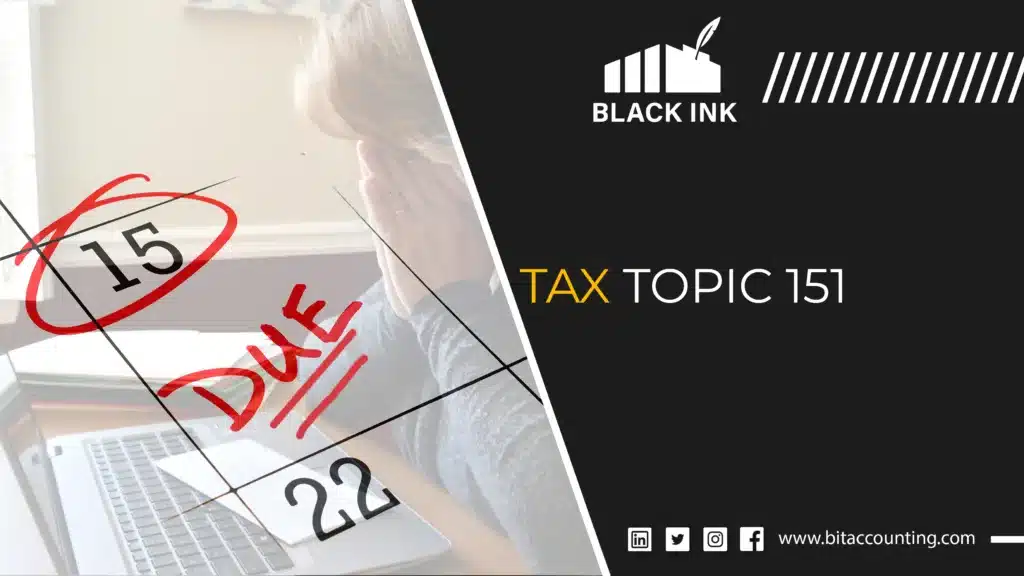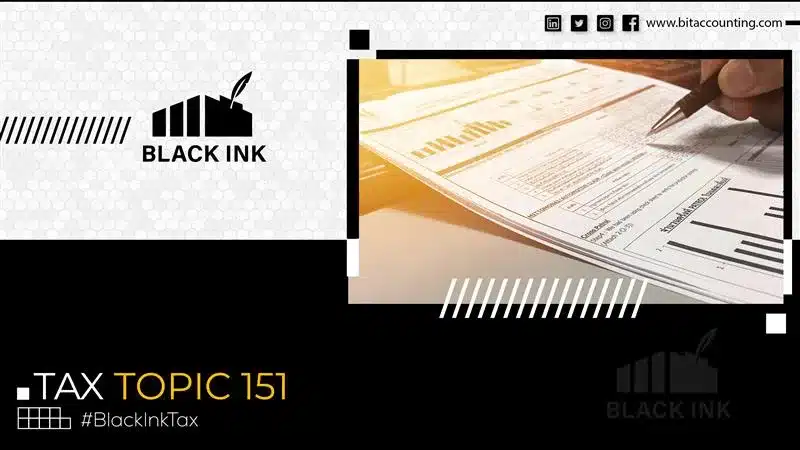
Table of Contents
Tax Topic 151: 5 Reasons for a Delay and What to Do Next
Waiting for your tax refund can feel like waiting for a long-promised check to finally arrive. You plan around it, count on it, and maybe even dream a little about how you’ll use it. Then suddenly, instead of a deposit date, you see “IRS Notice” or “Tax Topic 151” show up on the Where’s My Refund? tool or in your mailbox. That excitement quickly turns into confusion and frustration.
Here’s the good news: Tax Topic 151 doesn’t mean you’re in trouble. It simply means the IRS has decided to take a closer look at your return before releasing your refund. While it’s stressful, it’s a routine issue faced by millions of taxpayers every year.
In this guide, we’ll break down exactly what Tax Topic 151 is, the top five reasons you might receive it, and most importantly, what steps you should take to keep your refund moving forward. By the end, you’ll understand how to handle it calmly and be better prepared to avoid it in the future.
What Exactly Is IRS Tax Topic 151?
Tax Topic 151 is not a bill, an audit, or a charge of fraud. It’s simply the IRS’s way of telling you: “We’re reviewing your return, and your refund is on hold for now.” The system flags certain returns, and those get pulled out for manual review.
There are two common ways you’ll come across it:
- Online: If you check the IRS Where’s My Refund? tool, you might see a general message that references Tax Topic 151.
- By Mail: The IRS often follows up with a letter. Common ones include:
- Letter 4464C: “We need to verify your return information.”
- CP05: “We are reviewing your return.”
Think of these letters as the physical form of a Topic 151 notice. They don’t automatically mean something is wrong. Instead, they signal that the IRS wants to double-check a detail before releasing your money.
This happens to millions of taxpayers each year, especially when certain tax credits are claimed or when small mistakes appear on the return.
Why Did I Get a Topic 151 Notice? The 5 Most Common Reasons
1. What Errors or Inconsistencies Triggered a Review?
The IRS uses an automated system called the Information Return Processing (IRP) program. It matches the data you entered with the information employers, banks, and other institutions send directly to the IRS.
A review is triggered when:
- Your reported W-2 or 1099 income doesn’t match what your employer or bank submitted.
- You made a math error or typo (like entering the wrong Social Security Number or bank account digits).
- You claimed an incorrect filing status (for example, marking “Head of Household” when you don’t meet the requirements).
These aren’t major offenses—they’re simply mismatches that need a second look.
2. Which Tax Credits Are Most Frequently Flagged?
Certain credits are magnets for review because they are refundable (meaning you can get money back even if you owe no tax) and are often miscalculated or misused.
The big three include:
- Earned Income Tax Credit (EITC): Complicated rules around income levels and qualifying children.
- Additional Child Tax Credit (ACTC): The refundable part of the Child Tax Credit.
- American Opportunity Tax Credit (AOTC) and Lifetime Learning Credit (LLC): Education credits that require official documents like a 1098-T from your school.
Because of their value and complexity, these credits draw extra attention from the IRS.
3. Whose Identity Needs to Be Verified?
Identity theft is a big concern for the IRS. If something on your return looks unusual compared to past filings, your refund may be paused until your identity is confirmed. Examples include:
- A sudden income change or new dependent.
- A new bank account for direct deposit.
- Having an Identity Protection PIN (IP PIN) already tied to your account due to previous fraud.
Sometimes, this means you’ve been flagged to prevent fraud. Other times, it may mean someone else has already tried to file in your name.
4. What If My Return Is Incomplete or Has Missing Information?
Simple oversights can also cause a hold. For example:
- Forgetting to sign and date a paper return.
- Leaving out a W-2, 1099, or other supporting form.
- Skipping a required schedule needed for a credit or deduction.
In these cases, the IRS can’t finish processing your return until they receive the missing details.
5. What Other Uncommon Reasons Could Cause a Delay?
While less common, here are other situations that might trigger Topic 151:
- Refund Offset: Your refund could be reduced or applied toward unpaid taxes, child support, or federal debts. The IRS will send a separate notice if this happens.
- Amended Returns: If you file Form 1040-X while your original return is still in process, it can complicate and delay things.
- Injured Spouse Allocation: If you filed jointly and requested your share of a refund (Form 8379), the IRS needs extra time to separate the amounts.

What Should I Do Immediately After Seeing Topic 151?
First and foremost—don’t panic. Topic 151 is not a penalty. It’s simply a review step.
What you should do right away:
- Carefully read any notice you receive from the IRS.
- Check that your mailing address and contact information are correct.
- Gather your tax documents (W-2s, 1099s, credit paperwork) in case you need to respond.
Staying calm and organized is the best way to handle it.
Which Specific Actions Should I Take Based on the Reason?
Here’s a breakdown of what to do depending on why your return was flagged:
- Errors/Inconsistencies: Compare your return to your official documents line by line. If you spot a mistake, sometimes the IRS will correct it automatically. In other cases, you may need to file an amended return.
- Flagged Credits: Pull together all proof for the credit you claimed. For example, a 1098-T for education credits or proof of childcare expenses. Be ready to send copies if asked.
- Identity Verification: Follow the notice instructions exactly. This usually means calling a dedicated IRS number and answering security questions. Have both this year’s and last year’s return handy.
- Incomplete Return: If the IRS letter requests missing forms or signatures, send them right away. Always keep copies and use certified mail for proof.
When Can I Realistically Expect My Refund?
The IRS usually says: within 60 days of sending the notice. But the actual timeline can vary:
- Some cases resolve in just a few weeks.
- More complex issues (like identity verification or offset reviews) can stretch beyond two months.
The key takeaway: 60 days isn’t a punishment—it’s the IRS’s estimate for finishing its review. Keep checking Where’s My Refund? for updates. Once the hold is lifted, you’ll see a specific refund date.
If more than 60 days pass and you haven’t heard anything, it’s time to escalate.
What If the Delay Extends Beyond the Timeframe?
If you’ve waited beyond the IRS’s stated period with no progress, here are your options:
- Call the IRS: Use the phone number listed on your notice. Be ready for long hold times, and have your paperwork in front of you.
- Contact the Taxpayer Advocate Service (TAS): If the delay is causing serious financial hardship (like not being able to pay rent or bills), TAS may step in. Visit their site or call for help.
- Reach Out to Your Congressional Representative: As a last resort, many congressional offices have staff who help constituents with IRS-related issues. This can sometimes break the logjam.
How Can I Prevent a Topic 151 Delay Next Year?
While some IRS reviews are random, there are smart steps you can take to lower your chances of seeing this notice again:
- File Electronically: E-filing reduces math and clerical errors.
- Double-Check All Numbers: Ensure Social Security Numbers, names, and income match your forms exactly.
- Report All Income: Even freelance or gig income must be included to avoid mismatches.
- Understand Credit Rules: Only claim credits you truly qualify for. Use IRS tools if unsure.
- File Early: This gives both you and the IRS more time to fix issues before refund season peaks.
- Request an IP PIN: If you’ve had identity theft in the past, an Identity Protection PIN adds security.
Conclusion
Getting a Tax Topic 151 notice can be frustrating, but it doesn’t mean you’re in trouble. It simply means the IRS wants to double-check your return before sending your refund. By understanding the five most common reasons, following the right steps, and staying calm, you can navigate the delay with confidence.
At BIT Accounting, we help taxpayers handle notices like Topic 151 every year. If you want peace of mind, expert guidance, and a smoother tax season, reach out to our team. We’ll make sure you’re prepared, informed, and supported every step of the way.
FAQs
1: Does Tax Topic 151 mean my refund is denied?
No, it simply means your refund is being reviewed. The IRS may still release it once the review is complete.
2: How long does a Tax Topic 151 review take?
Most reviews are resolved within 60 days, though complex cases can take longer.
3: What should I do if I get Letter 4464C or CP05?
Read the letter carefully and provide any requested documents quickly. Keep copies of everything you send.
4: Can Tax Topic 151 affect next year’s refund?
Not directly, but if the same errors or issues happen again, your return could be flagged once more.
5: Who can help me if the IRS isn’t responding?
You can contact the IRS directly, reach out to the Taxpayer Advocate Service, or even request help from your Congressional Representative’s office.
GET FREE QUOTE FOR ALL OF OUR SERVICES
Black Ink will send you a free analysis of your current state and what would be the cost of managing either a separate accounting and bookkeeping services or a complete solution across New York, USA. Do get in touch and we will be happy to consult you with our bookkeeping services in NY, New York, USA.
